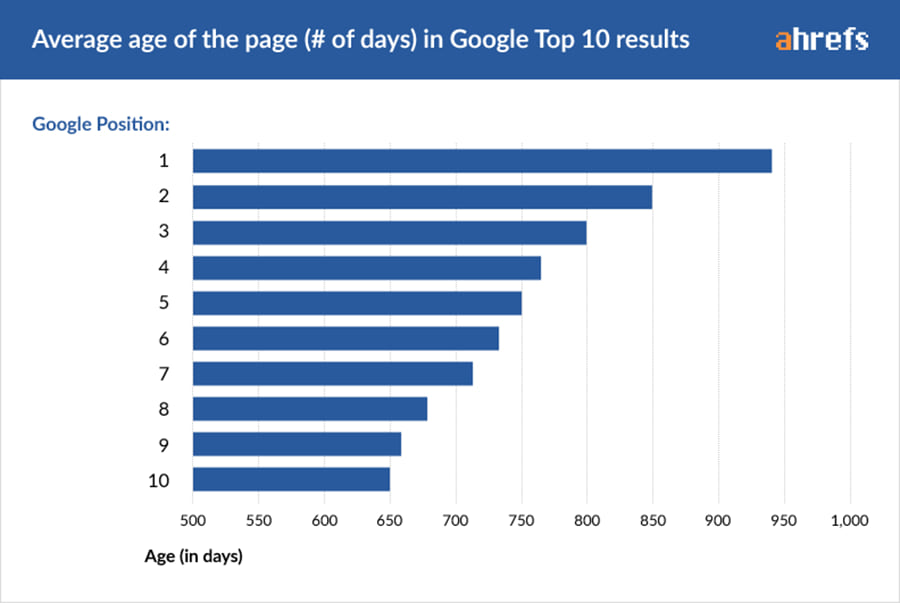Google is seen as a silver bullet of marketing by many. Truthfully, getting into the top few results of a given keyword can generate a ton of attention for whatever it is you’re trying to get out into the world. There are a series of common questions from clients, and this remains near the top: how do I get onto the first page of Google?
While the answer is the one that everybody hates (it depends), we do have a decent amount of information to help us take a strong guess. There’s still many caveats and mileage always varies, but if we look across enough sites, some important patterns do emerge.
Factors that impact rank
When the question is how to get onto that first page, we must look at what Google wants us to do. This issue is easier said than done, because:
- Google wants us to do many things
- Google is not always crystal clear on what all those things are
- They move the goalposts around, so what was critical 10 years ago may be less important today
There is much discussion around the topic of how best to keep Google happy. You’re welcome to dive into that rat’s nest at your leisure. For now we’ll touch on some of the most obvious ones. Google wants your website to be:
- well written and clear
- fast
- looking good at all screen sizes
- understandable by people who may have a disability such as poor vision
- offering fresh content
- secure
- useful and informative
In days long since passed, Google ran on keywords. You put the word you wanted to rank for in your site as many times as humanly possible, and you were rewarded. Like spoiled teenagers let loose in the Garden of Eden, we ruined that by trying to game the system. We made sites that were hard to use because they focused more on ranking high in Google than helping people. Sentences were so packed with keywords they were difficult to read or obnoxiously repetitive. This upset the mighty Google, and so they shifted their focus. If we can bring all their factors under one umbrella, it’s this: Google will reward you for having a good site.
Nobody can guarantee it
The manner in which Google has adjusted what they look for creates some interesting complexity. Ranking high now requires a holistic approach. No longer can we just add the word “lawyer” 200 times to a single page and call it a day. The site needs to be tweaked on so many levels, it’s becoming increasingly difficult for a company or individual to promise you a certain rank in Google. In fact, if you come across such a promise, congratulate yourself on finding the (first) red flag!
The fun doesn’t end there. It’s also impossible to guarantee a certain ranking because not all keywords are equal. If you’re trying to rank high for “dog cookies in Moose Jaw, Saskatchewan”, I have great news: you will not encounter much competition. Want to rank high for “lawyer in Manhattan”? Well then I have much worse news.
How can we tell how long it takes?
Now that we’ve established how complex it can be, we can move on to solving the problem. A company called Ahrefs offers search engine optimization (SEO) services. Their biggest feature is that they crawl the web in the same way that Google does. This means 24/7 they are gathering information from the internet and bringing it home to analyze what’s happening, and what’s happening on Google is their bread and butter.
As such, they are a perfect resource to answer our big question. Several years ago they ran a study that aimed to answer it in an interesting way. They randomly generated 2 million keywords, ran them through their system, and each keyword returned the top 10 pages associated with it (the top 10 pages for “dog cookies”, the top 10 pages for “lawyer”, and so on). Once they had their 20 million results, they started looking at the ages of these pages. What they found is not exactly exciting to people looking for a quick turnaround.
What do the numbers say?
When we look at the average age of a page at each position from 1-10, the resulting graph is fairly clear: pages rank better as they age. The average age of a page at position #10 is 2+ years old, while the average age of a page at position #1 is almost 3 years old.

When we consider what Google is looking for, this isn’t surprising. Google wants to ensure the pages in the top 10 are a trusted authority on the topic. It gauges this by seeing what pages are visited continuously over time, how many other pages link to them, and so on. A page younger than a couple years is going to have a difficult time building up this reputation.
This isn’t to say a page built within a year can’t get into the top 10, it’s just quite rare. Only 5.7% of pages in the top 10 were created within the previous year. This number gets even more bleak when we start to factor in the popularity of the keyword. A low volume keyword is defined as one that gets fewer than 1000 searches in a month. Of the 5.7% of lucky pages that made it into the top 10 within a year, 4.8% were low volume keywords (because they had very little competition). Medium volume keywords get 5000-20,000 searches a month, and their success rate dropped to 1.3%. High volume keywords that get more than 50,000 searches in a month? 0.3%.
What’s a good strategy?
While this information does typically sting a bit with people who were expecting a bit more, it does provide us a clear path forward. The new name of the game is patience, and while I appreciate that may not be an option for some, at the very least it can direct you down a different marketing route. If you’re looking at your budget and all you see is enough to commit to a few months, then you at least know that money may go further in a different place.
So what’s it gonna cost?
This will be in a similar vein to my post on website costs, because the answer to this one also isn’t super clear. I can offer some averages I’ve seen in the industry, and they seem to match what many say online (dollar figures are all in Canadian). Most smaller companies start around $2500-$5000/month, and I’ve seen larger companies start at $10,000/month. As you can see, prices can climb mighty quick, especially when we’re talking about an investment that could span years.
A word of caution
Years ago I had a client. This client was a great person with a company that sold an expensive product, so they did not need to move a lot of it to make good money. For this reason they wanted to invest heavily into SEO, because to them an investment of $50,000/year legitimately made a ton of financial sense if it could bring them even one extra client.
So we got to work and brought in a dedicated SEO specialist to help out. A couple months into the project, we receive some concerning news–the company in question had at one point paid somebody to do some SEO work for them, and this individual broke some rules. What they did exactly I can’t speak to, but Google penalized the site for trying to game the system. This is bad and you do not want this to happen (it’s often referred to as being “banished to Google hell”).
At the time I write this, it’s been about 6 years and they’re still working their way up from a position that they can’t seem to get beyond (several pages down where statistically almost nobody clicks to). I’m unsure if they’ve been putting money towards this problem or not as we lost them as a client shortly after discovering the problem.
Moral of the story: do not cut corners on this. Three years to get to page 1 is a lot, but it’s fewer than forever.
In conclusion
Getting to page 1 of Google for your chosen keyword is a highly coveted task, so it’s not one you should take on half-heartedly. Progress is possible, but it’s not going to happen without effort. If getting to the first page was easy, everybody would be there. The ones that do are not magic, but rather they are patient and pay attention to long-term investment over short-term gains. It’s completely reasonable to evaluate this path and determine that it’s not for you right now. Whatever your decision, I wish you well.





